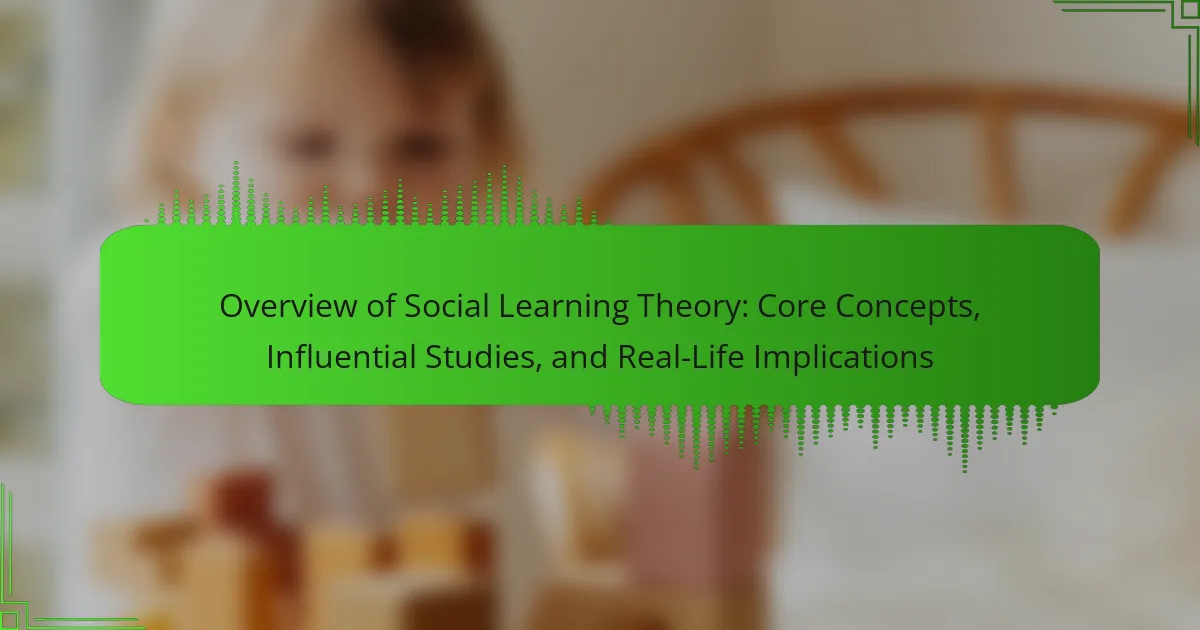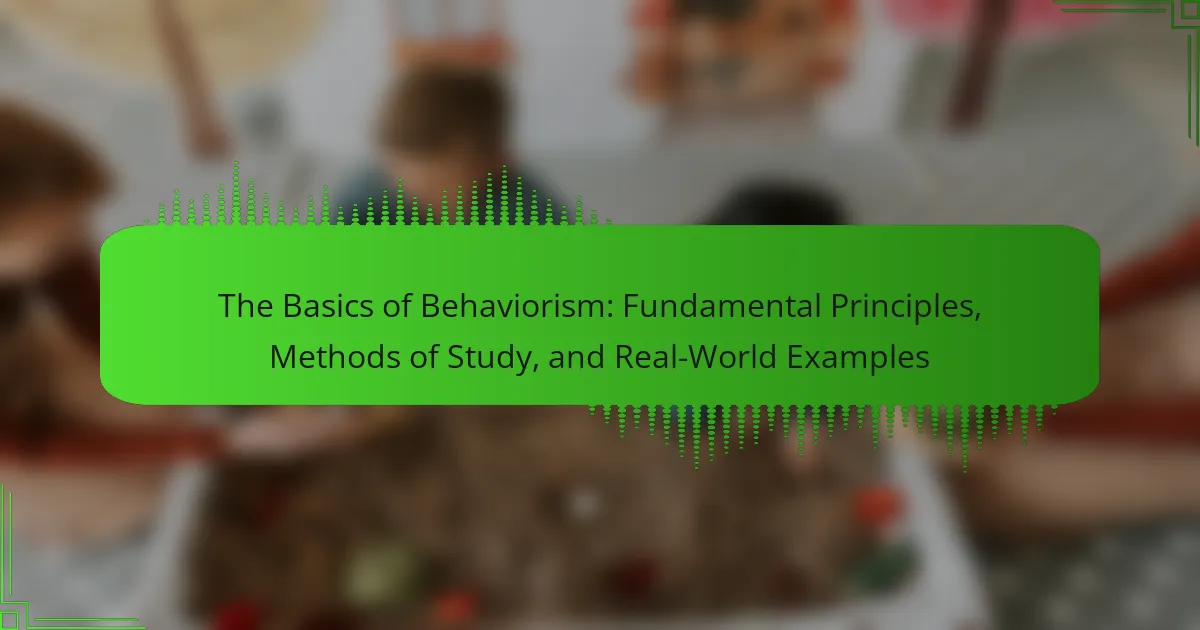Social Learning Theory is a psychological concept developed by Albert Bandura in the 1960s, explaining how individuals learn behaviors through observation and imitation of others. Key studies, such as the Bobo doll experiment, demonstrated that children can acquire aggressive behaviors by watching adults, illustrating the theory’s emphasis on social context in learning. This theory has significant implications in various fields, including education and psychology, highlighting the influence of role models and social environments on behavior. The article will explore the core concepts of Social Learning Theory, influential studies validating its principles, and its real-life applications in areas like education, parenting, and media influence.
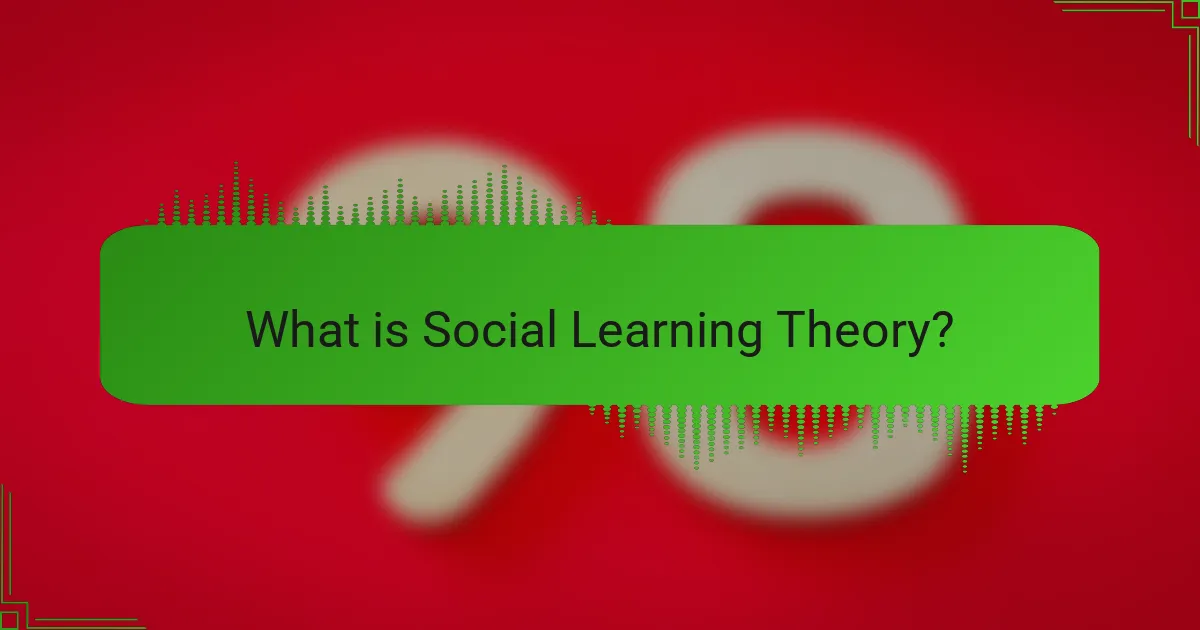
What is Social Learning Theory?
Social Learning Theory is a psychological concept that explains learning through observation and imitation. It posits that individuals can acquire new behaviors by watching others and the consequences of those behaviors. Developed by Albert Bandura in the 1960s, this theory emphasizes the importance of social context in learning. Bandura’s famous Bobo doll experiment demonstrated that children imitate aggressive behaviors observed in adults. This research highlighted that learning is not solely a result of direct reinforcement but also occurs through social interactions. Social Learning Theory has significant implications in various fields, including education and psychology. It suggests that role models and social environments play crucial roles in shaping behavior.
How does Social Learning Theory explain learning processes?
Social Learning Theory explains learning processes through observation and imitation. It posits that individuals learn behaviors by watching others. This theory emphasizes the importance of modeling, where a person learns by observing the actions of a role model. Albert Bandura, a key figure in this theory, conducted experiments demonstrating that children imitate aggressive behavior after observing adults. His famous Bobo doll experiment showed that children exposed to violent behavior were more likely to replicate it. Additionally, Social Learning Theory highlights the role of reinforcement and punishment in learning. Observers are influenced not only by what they see but also by the consequences that follow behaviors. This dual process of observation and consequence shapes learning and behavior in social contexts.
What are the key principles of Social Learning Theory?
The key principles of Social Learning Theory include observational learning, imitation, and modeling. Observational learning occurs when individuals learn by watching others. This principle emphasizes that behaviors can be acquired without direct experience. Imitation is the process of replicating observed behaviors. It highlights how individuals can adopt new behaviors seen in others. Modeling refers to the demonstration of behaviors for others to observe and learn from. This principle underscores the importance of role models in the learning process. Additionally, the theory posits that reinforcement and punishment influence the likelihood of behavior imitation. Bandura’s Bobo doll experiment in 1961 exemplifies these principles, showing that children imitate aggressive behavior they observed in adults.
How do observation and imitation play a role in learning?
Observation and imitation are crucial processes in learning. They allow individuals to acquire new behaviors by watching others. This is a fundamental aspect of social learning theory. When a person observes a model performing a task, they can replicate that behavior. Imitation reinforces learning by providing a framework for understanding actions. Research by Albert Bandura demonstrated this in the Bobo doll experiment. Children who observed aggressive behavior towards the doll were more likely to imitate it. This indicates that observation and imitation are powerful tools for learning.
Why is Social Learning Theory important in psychology?
Social Learning Theory is important in psychology because it explains how individuals learn behaviors through observation and imitation. This theory emphasizes the role of social influence and modeling in the learning process. Albert Bandura, a key figure in this theory, conducted experiments demonstrating that children imitate aggressive behavior observed in adults. His famous Bobo doll experiment showed that children who witnessed adults acting aggressively towards the doll were more likely to exhibit similar behavior. This underscores the significance of observational learning in shaping behavior and attitudes. Furthermore, Social Learning Theory integrates cognitive processes, highlighting that individuals actively interpret and process information from their environment. This comprehensive approach has influenced various fields, including education, therapy, and media studies, by providing insights into behavior modification and the impact of role models.
What historical context led to the development of Social Learning Theory?
Social Learning Theory emerged from the historical context of behaviorism and cognitive psychology in the mid-20th century. Behaviorism dominated psychology, focusing on observable behaviors and external stimuli. Key figures like B.F. Skinner emphasized reinforcement and punishment in shaping behavior. Albert Bandura introduced Social Learning Theory in 1961, expanding on these ideas. He incorporated cognitive processes, highlighting the role of observation and imitation in learning. Bandura’s famous Bobo doll experiment demonstrated that children learn behaviors through modeling. This historical blend of behaviorism and cognitive psychology laid the groundwork for Social Learning Theory’s development.
How does Social Learning Theory differ from other learning theories?
Social Learning Theory differs from other learning theories by emphasizing the role of observational learning. It posits that individuals can learn behaviors by watching others rather than through direct experience. This approach contrasts with behaviorist theories, which focus solely on reinforcement and punishment. Cognitive theories also differ as they prioritize internal mental processes over social context. Research by Albert Bandura, notably the Bobo doll experiment, demonstrates that children imitate aggressive behaviors observed in adults. This evidence supports the idea that social context significantly influences learning, a key distinction from other theories.
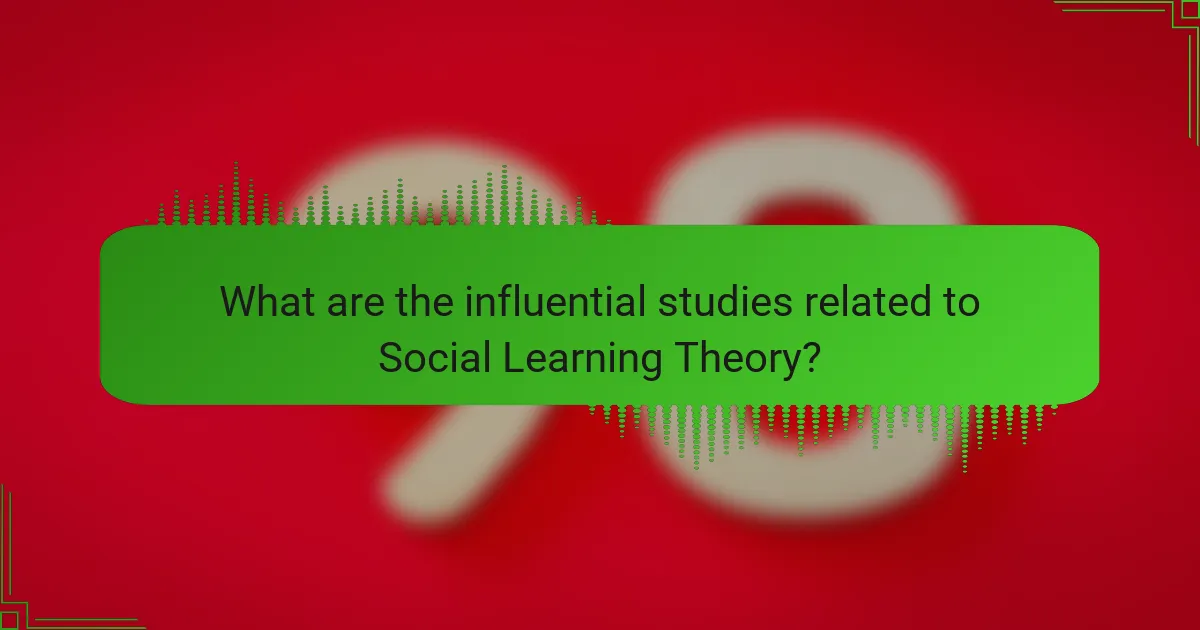
What are the influential studies related to Social Learning Theory?
The influential studies related to Social Learning Theory include Albert Bandura’s Bobo Doll Experiment. This study demonstrated that children imitate aggressive behavior observed in adults. Conducted in 1961, it showed that children exposed to aggressive models were more likely to act aggressively themselves. Bandura’s research established observational learning as a key component of social learning. Another significant study is Bandura’s 1977 research on self-efficacy, emphasizing the role of belief in one’s abilities in learning processes. These studies validate the principles of Social Learning Theory and its application in understanding behavior.
What role did Albert Bandura play in Social Learning Theory?
Albert Bandura was a key figure in the development of Social Learning Theory. He proposed that learning occurs through observation and imitation of others. Bandura’s work emphasized the importance of modeling behavior in social contexts. His famous Bobo doll experiment demonstrated that children could learn aggressive behaviors by watching adults. This research highlighted the role of environmental influences on behavior. Bandura introduced the concept of reciprocal determinism, where personal, behavioral, and environmental factors interact. His contributions laid the foundation for understanding how social contexts shape learning and behavior. Bandura’s theory has been influential in fields such as psychology, education, and sociology.
What findings emerged from the Bobo Doll experiment?
The Bobo Doll experiment found that children imitate aggressive behavior observed in adults. Conducted by Albert Bandura in the 1960s, the study involved children watching adults interact with a Bobo Doll. Those who observed aggressive actions were more likely to exhibit similar behaviors. This demonstrated the influence of observational learning on behavior. Bandura’s findings highlighted that social learning occurs through modeling. The experiment also showed that children can learn new behaviors without direct reinforcement. These results supported the theory that behavior can be acquired through social observation. The implications of the study extend to understanding how media influences behavior in children.
How did Bandura’s studies shape the understanding of aggression and behavior?
Bandura’s studies significantly shaped the understanding of aggression and behavior through his Social Learning Theory. He demonstrated that aggression can be learned through observation and imitation. The Bobo Doll experiment, conducted in 1961, provided concrete evidence of this concept. In the experiment, children who observed an [censured] behaving aggressively towards a Bobo Doll were more likely to exhibit similar aggressive behaviors themselves. This finding highlighted the role of modeling in learning behaviors. Bandura’s work shifted the focus from direct reinforcement to observational learning. His studies emphasized that environmental factors influence behavior, expanding the understanding of aggression beyond innate or learned responses. This research has had lasting implications in psychology, education, and media studies.
What other significant research has contributed to Social Learning Theory?
Significant research contributing to Social Learning Theory includes Albert Bandura’s Bobo Doll Experiment conducted in 1961. This study demonstrated that children imitate aggressive behavior observed in adults. Another influential study is Bandura’s 1977 work, “Social Learning Theory,” which expanded on observational learning principles. Additionally, the work of Walter Mischel in the 1960s examined the role of cognitive processes in social learning. Mischel’s research highlighted the importance of situational factors in behavior. These studies collectively laid the groundwork for understanding how social learning occurs through observation and imitation.
How have subsequent studies validated or challenged Bandura’s findings?
Subsequent studies have both validated and challenged Bandura’s findings. Research has confirmed the role of observational learning in behavior acquisition. For instance, studies on children show that they imitate aggressive behavior after witnessing it, supporting Bandura’s conclusions. However, some studies have questioned the extent of this influence. Critics argue that environmental factors play a significant role in shaping behavior beyond mere observation. For example, research by Akers (1998) suggests that social reinforcement is crucial in behavior development. Additionally, meta-analyses indicate variability in the strength of observational learning effects across contexts. This suggests that while Bandura’s theory holds relevance, it may not fully encompass all aspects of learning and behavior.
What methodologies have researchers used to explore Social Learning Theory?
Researchers have used various methodologies to explore Social Learning Theory. Experimental studies are common, allowing researchers to observe behavior in controlled environments. Observational studies also play a key role, where researchers analyze behaviors in natural settings. Surveys and questionnaires gather self-reported data on social learning experiences. Longitudinal studies track changes over time, providing insights into the development of learned behaviors. Case studies offer in-depth analysis of specific instances of social learning. Meta-analyses compile results from multiple studies to identify overarching patterns. Each methodology contributes uniquely to understanding the complexities of Social Learning Theory.
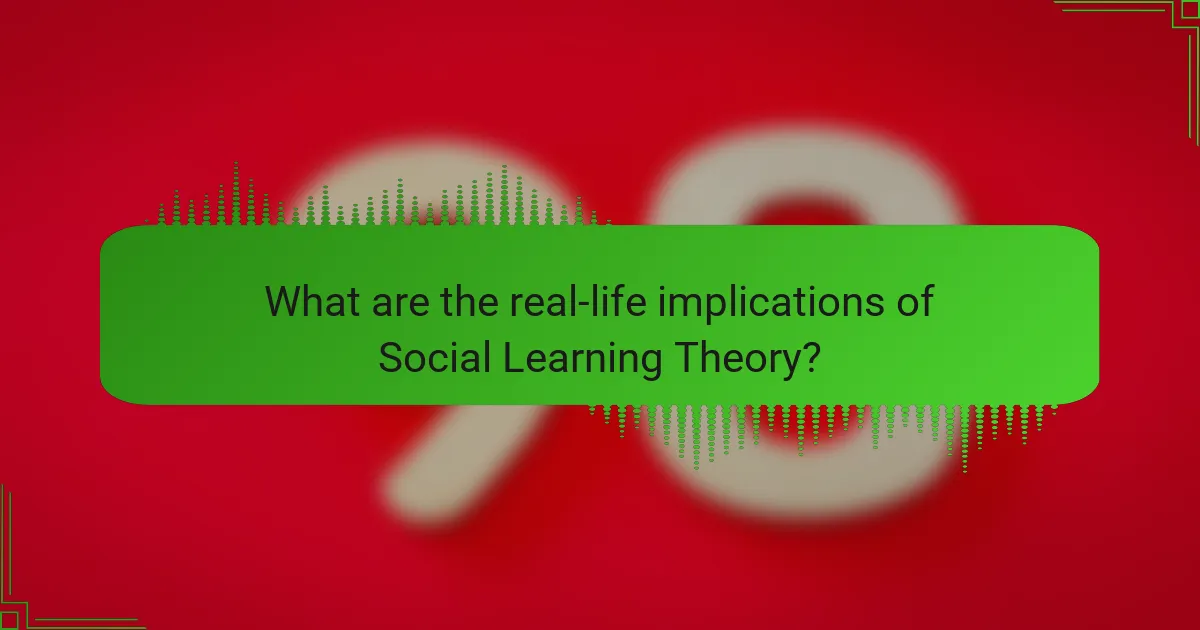
What are the real-life implications of Social Learning Theory?
Social Learning Theory implies that behavior is learned through observation and imitation. This concept affects various real-life scenarios, including education, parenting, and media influence. In educational settings, teachers model behaviors that students may emulate. For instance, a teacher demonstrating problem-solving skills encourages students to adopt similar strategies. In parenting, children often imitate their parents’ behaviors, which can shape their social skills and values. Research shows that children who observe prosocial behavior are more likely to engage in similar actions. Media also plays a significant role; exposure to positive role models can inspire viewers to adopt beneficial behaviors. Conversely, negative portrayals can lead to undesirable actions. Overall, Social Learning Theory highlights the importance of role models in shaping behaviors across different contexts.
How can Social Learning Theory be applied in educational settings?
Social Learning Theory can be applied in educational settings through modeling, reinforcement, and observation. Educators can demonstrate desired behaviors for students to imitate. This can enhance learning through peer interactions and collaborative activities. For instance, group projects allow students to observe and learn from one another. Reinforcement can be utilized by rewarding positive behaviors to encourage their repetition. Research shows that students learn effectively when they see their peers succeed. Additionally, incorporating multimedia resources can provide diverse examples for students to emulate. Overall, Social Learning Theory fosters a collaborative learning environment that enhances student engagement and understanding.
What strategies can educators use to leverage Social Learning Theory?
Educators can leverage Social Learning Theory by incorporating observational learning, modeling behaviors, and facilitating peer interactions. Observational learning allows students to learn by watching others. This can be implemented through demonstrations and role-playing activities. Modeling behaviors involves educators exemplifying desired behaviors and attitudes. When students see positive behaviors modeled, they are more likely to emulate them. Facilitating peer interactions encourages collaboration and communication among students. Research shows that social interactions enhance learning experiences and retention. By utilizing these strategies, educators can create an environment conducive to social learning.
How does peer influence affect learning in classrooms?
Peer influence significantly affects learning in classrooms by shaping students’ attitudes and behaviors towards education. When students observe their peers valuing academic success, they are more likely to adopt similar attitudes. This phenomenon is supported by Bandura’s Social Learning Theory, which emphasizes the role of observational learning. Research indicates that students are motivated to perform better when they see their peers engaged in learning activities. For instance, a study by Wentzel (1998) found that positive peer interactions correlate with increased academic achievement. Furthermore, collaborative learning environments foster peer support, enhancing overall learning outcomes.
What are the implications of Social Learning Theory in behavior modification?
Social Learning Theory implies that behavior modification can occur through observational learning. Individuals can learn new behaviors by watching others and imitating them. This theory emphasizes the role of modeling in behavior change. For instance, children often mimic the actions of adults or peers. Reinforcement and punishment also play a crucial role in this process. Observing the consequences of others’ behaviors can influence one’s choices. Research shows that role models can significantly impact behavior modification efforts. Studies indicate that exposure to positive role models leads to improved behavioral outcomes.
How can Social Learning Theory inform therapy and counseling practices?
Social Learning Theory informs therapy and counseling practices by emphasizing the role of observation and modeling in behavior change. Therapists can utilize this theory to encourage clients to learn from others’ experiences. By observing positive behaviors in peers or role models, clients may adopt similar strategies in their own lives. This approach is particularly effective in group therapy settings, where clients can witness transformations in others. Research indicates that observational learning can significantly enhance therapeutic outcomes. For example, a study by Bandura demonstrated that individuals who observed effective coping strategies were more likely to implement those strategies themselves. Thus, integrating Social Learning Theory into therapy can foster skill acquisition and promote healthier behaviors.
What role does modeling play in changing behaviors?
Modeling plays a crucial role in changing behaviors by demonstrating desired actions through observation. Individuals often imitate behaviors they see in others, especially those they admire or consider role models. This process is fundamental to social learning theory, which emphasizes that learning occurs in a social context. Research shows that children exposed to aggressive behaviors in models are more likely to exhibit similar aggression themselves. For example, the famous Bobo doll experiment by Albert Bandura illustrated that children who observed adults acting aggressively towards a doll were more likely to replicate that behavior. Modeling influences behavior change by providing examples and reinforcing social norms.
What practical tips can individuals use to apply Social Learning Theory in everyday life?
Individuals can apply Social Learning Theory in everyday life by observing and imitating positive behaviors. They should seek role models who exemplify desirable traits. Engaging in group activities fosters social interaction and learning from peers. Setting specific goals can enhance motivation and focus on desired behaviors. Providing reinforcement for positive actions encourages repetition of those behaviors. Reflecting on personal experiences aids in understanding the impact of social influences. Utilizing media, such as educational videos, can demonstrate effective behaviors. Lastly, creating a supportive environment promotes continuous learning and growth.
Social Learning Theory is a psychological framework developed by Albert Bandura that explains how individuals learn behaviors through observation and imitation of others. This article provides an overview of the core concepts of Social Learning Theory, including observational learning, modeling, and the significance of social context in behavior acquisition. It discusses influential studies, particularly Bandura’s Bobo Doll experiment, which demonstrated the impact of observed behavior on children’s actions. Additionally, the article explores the real-life implications of the theory in education, therapy, and behavior modification, highlighting the importance of role models in shaping behavior.
